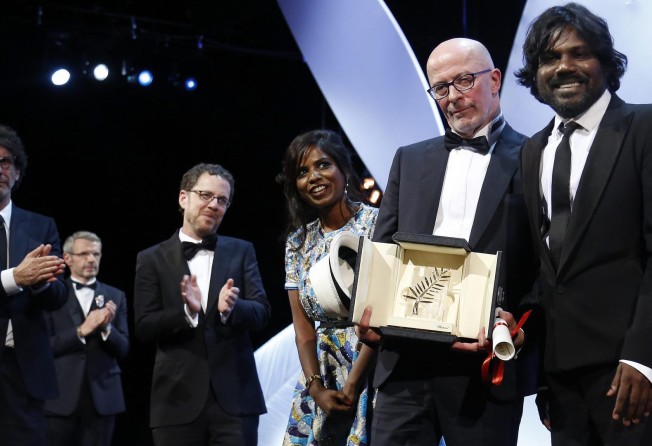
68th Cannes Film Festival full of surprises, and some sex

Each year Cannes serves up plenty of surprises - both on and off screen. The first day of the 68th edition of the world's most famous film festival saw Salma Hayek eating the boiled heart of a sea monster in Matteo Garrone's visually rich triptych of twisted fairy stories, Tale of Tales.
By the third day, Colin Farrell - during my interview with him - was so distracted by a stray hair on my eyebrow that he decided to pluck it. Call it too much sun or too much rosé wine, but Cannes does strange things to people. His penchant for random grooming aside, Farrell gave one of the competition's better performances - a masterclass in deadpan delivery in The Lobster, which saw its Greek writer-director Yorgos Lanthimos claim the Jury Prize. One of several English-language efforts in the competition by European directors, it's an off-kilter, near-future parable, where singletons are sent to a hotel to find a mate or be turned into an animal.
Right up the street, then, of jury heads Joel and Ethan Coen - except the siblings had a bigger surprise to come, with the prestigious Palme d'Or going to Jacques Audiard's Dheepan, a gripping tale of a Sri Lankan Tamil Tiger fighter who arrives in Paris to become the caretaker of a hellish apartment block in a working class suburb.
Asian cinema was well represented. Jia Zhangke's latest, Mountains May Depart, proved a rather disjointed tale of fathers, mothers and sons spanning a quarter-century (despite rousing use of the Pet Shop Boys' anthem Go West to bookend the film); it once again reunited him on screen with his wife, Zhao Tao. Much better was Hou Hsiao-hsien's The Assassin, an exquisite martial arts movie, set in the Tang dynasty and starring Shu Qi as the titular killer, that rightly took the best director award.
The Taiwanese star's appearance for the premiere was her second at Cannes; earlier she joined fellow cast members including Huang Bo and Chen Kun for a press conference about forthcoming Chinese fantasy saga The Ghouls, based on popular online novels by Zhang Muye. Director Wuershan unveiled three minutes of exclusive footage, enough to say that this Tomb Raider-meets- The Mummy supernatural adventure looks tremendous fun.

With this being Cannes' Year of the Women, the jury did well to award Rooney Mara a share of the best actress prize for her role in Todd Haynes' impeccably crafted lesbian drama Carol, co-starring Cate Blanchett. Mara's half-share aside, the acting honours all went to French screen stars: Emmanuelle Bercot was named joint best actress for her part in Maïwenn's relationship drama Mon Roi, while best actor Vincent Lindon was at his understated best as a soul-sapped security guard in The Measure of a Man.

Away from the main competition, there was plenty to feast on. A personal highlight was Jeremy Saulnier's Green Room. Appearing in the Director's Fortnight, where his 2012 debut Blue Ruin also played, it's a visceral thriller about a punk band who arrive at an isolated dive bar to find themselves in a life-and-death siege when they come to blows with a group of skinhead neo-nazis. Starring X-Men's Patrick Stewart, who is utterly menacing as the pragmatic owner of the bar, it's like a graffiti-strewn Straw Dogs: dank, dirty and dangerous.
Then there was Amy, British director Asif Kapadia's methodical documentary about late singer Amy Winehouse. Kapadia applied the same forensic techniques that he used in Senna, his much-loved motor racing documentary, in piecing together a moving portrait of the Back to Black singer, who died of alcohol poisoning in 2011 at the age of 27.
While the Croisette was decorated as usual with advertisements for forthcoming blockbusters - Terminator Genisys, The Peanuts Movie and the final part of The Hunger Games were all making their presence felt - Hollywood didn't dominate, if you exclude out-of-competition screenings for Mad Max: Fury Road and Pixar's inventive new animated title Inside Out, both of which saw jaded critics whooping with glee in the festival's giant Palais.
Rather, Cannes proved it was a place for experimentation - of the sexual sort, if you're Gaspar Noé, who came with his 3D hardcore tale Love. This was expected to be one of the more controversial inclusions in the festival. In the end, it was surprisingly tame - despite the threesomes, orgies and transsexual encounters. How times have changed.